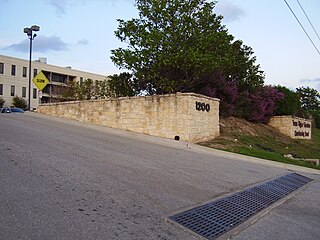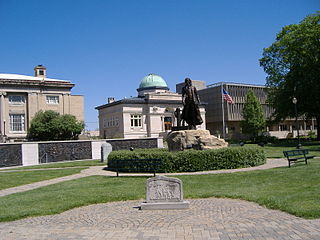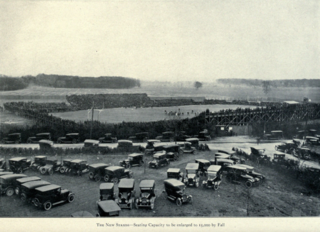Related Research Articles

Jeffersonville is a city and the county seat of Clark County, Indiana, United States, situated along the Ohio River. Locally, the city is often referred to by the abbreviated name Jeff. It lies directly across the Ohio River to the north of Louisville, Kentucky, along I-65. The population was 49,447 at the 2020 census.

Lubbock is the 10th-most populous city in the U.S. state of Texas and the seat of government of Lubbock County. With a population of 263,930 in 2022, the city is also the 85th-most populous in the United States. The city is in the northwestern part of the state, a region known historically and geographically as the Llano Estacado, and ecologically is part of the southern end of the High Plains, lying at the economic center of the Lubbock metropolitan area, which had an estimated population of 328,283 in 2022.

Texas Tech University is a public research university in Lubbock, Texas. Established on October 2, 1923, and called Texas Technological College until 1969, it is the flagship institution of the five-institution Texas Tech University System. As of Fall 2022, the university enrolled 40,528 students, making it the sixth-largest university in Texas. Over 25% of its undergraduate student population identifies as Hispanic so the university has been designated a Hispanic-serving institution (HSI).
William Curry Holden was an American historian and archaeologist. In 1937, he became the first director of the Museum of Texas Tech University in Lubbock, Texas.
The Jeffersonville, Madison and Indianapolis Railroad (JM&I) was formed in 1866 as a merger between the Indianapolis and Madison Railroad and the Jeffersonville Railroad.

The Daily Toreador, also known as The DT, is the student newspaper of Texas Tech University in Lubbock, Texas. The newspaper was first published in 1925 as The Toreador and later changed its name to The University Daily before arriving at the current name in 2005. All content for The DT is produced by a staff around 40 members including editors, reporters and photographers. The DT has received numerous regional and national awards, including a Columbia Scholastic Press Association Gold crown award, two Columbia Scholastic Press Association Silver crown awards, and two Associated Collegiate Press Pacemaker Award finalists. As well, the paper counts five Pulitzer Prizes and four winners amongst its former staff members.

David Quammen is an American science, nature, and travel writer and the author of fifteen books. His articles have appeared in Outside Magazine, National Geographic, Harper's, Rolling Stone, The New York Times Book Review, The New Yorker, and other periodicals.

Texas has over 1,000 public school districts—all but one of the school districts in Texas are independent, separate from any form of municipal or county government. School districts may cross city and county boundaries. Independent school districts have the power to tax their residents and to assert eminent domain over privately owned property. The Texas Education Agency (TEA) oversees these districts, providing supplemental funding, but its jurisdiction is limited mostly to intervening in poorly performing districts.

The Indianapolis Public Library (IndyPL), formerly known as the Indianapolis–Marion County Public Library, is the public library system serving the citizens of Marion County, Indiana, United States and its largest city, Indianapolis. The library was founded in 1873 and has grown to include a Central Library building, located adjacent to the Indiana World War Memorial Plaza, and 24 branch libraries spread throughout the county. In 2021, the public library system circulated 7.1 million items and hosted more than 2,500 programs for its 282,000 cardholders.

Warder Park is located in Jeffersonville, Indiana on Court Avenue. This park has been a part of the community since the mid-19th century, when it had a bakery to produce hardtack to Union soldiers during the American Civil War. The park wasn't established officially until the year 1881 and is named after then Mayor Luther Warder. Warder had wanted the site for a new city hall, but the city council chose a site between Spring and Pearl on the north side of Market Street for the city hall, and named the park after Warder as a gesture of goodwill. A Carnegie Library was built in 1903.

The Jeffersonville Township Public Library is a public library system in Jeffersonville, Indiana, United States comprising two locations: the main library at 211 East Court Avenue in Jeffersonville and the Clarksville Branch at 1312 Eastern Boulevard in Clarksville, Indiana. The rest of Clark County, Indiana is served by the Charlestown-Clark County Public Library system, with which the Jeffersonville library has a reciprocal borrowing agreement.

Cartier Field was a stadium in Notre Dame, Indiana, first dedicated on May 11, 1900, as an arena for football, baseball, track and field, and bicycling. It hosted the University of Notre Dame Fighting Irish football team from 1900 to 1928 and held nearly 30,000 people at its peak. The stands were torn down after the 1928 season to make room for Notre Dame Stadium, which opened in 1930. Notre Dame played its entire 1929 schedule away from campus, went undefeated (9–0) and won the National Championship. At Coach Knute Rockne's insistence, Cartier Field's grass was transplanted into Notre Dame Stadium.
The Center for Research Libraries is a consortium of North American universities, colleges, and independent research libraries, based on a buy-in concept for membership of the consortia. The consortium acquires and preserves traditional and digital resources for research and teaching and makes them available to member institutions through interlibrary loan and electronic delivery. It also gathers and analyzes data pertaining to the preservation of physical and digital resources, and fosters the sharing of expertise, in order to assist member libraries in maintaining their collections.

The Museum of Texas Tech University is part of Texas Tech University in Lubbock, Texas. It is made up of the main museum building, the Moody Planetarium, the Natural Science Research Laboratory, the research and educational elements of the Lubbock Lake Landmark, and the Val Verde County research site. It features collections in anthropology, fine arts, clothing and textiles, history, natural sciences and paleontology.

IUPUI University Library is the university library of Indiana University–Purdue University Indianapolis. IUPUI is an urban campus of Indiana University and Purdue University in Indianapolis, Indiana, United States. Indiana University is the managing partner.

The 1943 Texas Tech Red Raiders football team represented Texas Technological College as an independent during the 1943 college football season. Led third-year head coach Dell Morgan, the Red Raiders compiled a record of 4–6.
The Texas Tech Alumni Association is the alumni association for former students of Texas Tech University. The organization was founded in 1927 and sponsors multiple programs for Texas Tech University and its alumni.
Tim Tadlock is a collegiate baseball coach and former player. He served as head coach of the Grayson Vikings representing Grayson County College (GCC) (1997–2005) and the Texas Tech Red Raiders representing Texas Tech University (2013–present). Tadlock guided the Grayson Vikings to back-to-back National Junior College Athletic Association (NJCAA) Division I World Series titles in 1999 and 2000. In 2014, Tadlock led his alma mater to their first College World Series appearance and received the Skip Bertman Award, presented to the college baseball coach of the year by the College Baseball Foundation.

The Billy Sunday Home was the residence of William A (Billy) Sunday, Helen (Ma) Sunday, their four children, and the family's live-in housekeeper and nanny. Located in the Winona Lake Historic District in Kosciusko County, Indiana, it is a prime example of a bungalow built in the Arts and Crafts architectural style.
The following is a timeline of the history of the city of Lubbock, Texas, USA.
References
- ↑ Connie Lauerman, "A Rare Opportunity For Students To Get In Touch With History", Chicago Tribune , May 27, 1998.
- ↑ Paula Burba, "Remnant Trust grows as new home prepared in S. Indiana", The Courier-Journal , October 10, 2005.
- ↑ "Rare works collection goes public", Associated Press in Post-Tribune , August 21, 2006.
- ↑ David A. Mann, "Jeffersonville leaders look ahead at fate of Carnegie Library after Remnant Trust departs: The remnant fuss", News and Tribune , April 18, 2009.
- ↑ "The Remnant Trust Moves to Winona Lake", Manufacturing Close-Up, June 17, 2010 .
- ↑ Kerry Hubbart, "Remnant Trust headquarters moves closer to Fort Wayne" Archived 2014-05-18 at the Wayback Machine , The News-Sentinel , December 4, 2010.
- ↑ Blake Ursch, "Tech to be permanent home of collection of priceless manuscripts", Lubbock Avalanche-Journal , May 4, 2014.
